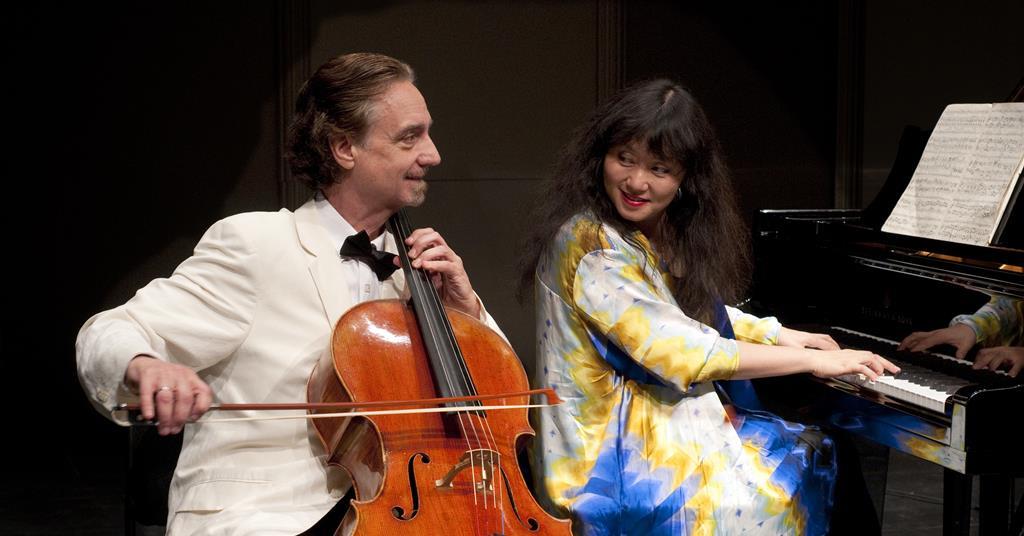Discover more Featured Stories like this in The Strad Playing Hub
A few weeks before I attend the 2025 Music@Menlo Festival and Chamber Music Institute, David Finckel and Wu Han announced they were stepping down as artistic directors, with (another) cello-piano husband and wife duo and long-standing festival artists Dmitri Atapine and Hyeyeon Park to take the helm after the 2026 festival.
The idea of the festival was born in the wake of the September 11 attacks in 2001, with 2002 serving as a pilot year, and the inaugural festival held from 3 to 18 August 2003. It’s been held annually since then (with the exception of 2020), combining high-level festival artists with chamber music coaching and educational opportunities through the festival’s Chamber Music Institute, a core component of the event at Menlo School, in the heart of Silicon Valley.
With years of experience in the bag, it’s no wonder that the duo has some poignant memories of the festival. Looking at a pile of old programme booklets from the years, we take a look at the cover of the inaugural 2003 edition, with a painting by the hand of Robert Kelly. The angular red shapes against a beige backdrop was created just after the attacks in New York City in 2001.
‘His apartment was right next to the World Trade Center,’ Finckel informs me about Kelly. ‘He was in his house, with the window open. And he heard this roar. He instinctively got up and closed the window, and as he did, it all went black outside. He closed the window just in time, otherwise he would have been buried in dust.’

Perhaps those monumental events on September 11 served as a catalyst for creating a new festival. ‘We all needed music,’ says Wu Han, ‘and 2002 was the first pilot year.’ This is reflected in the artistic directors’ welcome message on the first page of the first festival programme, which reads:
‘What inspires a community to join forces and breathe life into a new music festival? Perhaps we yearn for opportunities to enjoy humanity’s greatest achievements, to bring into our midst that which is genuinely beautiful, profound, challenging, and uplifting. Music@Menlo celebrates great music, the most powerfully spiritual and directly inspiring of all the arts.’
The festival has explored a huge variation of themes throughout its history. Its third season in 2006 celebrated the 250th anniversary of Mozart’s birth. Entitled Returning to Mozart, the theme was inspired by many different people saying: ‘the last thing I want to hear on Earth is Mozart.’ And so, this was reflected in the festival programming, where, after a concert of diverse repertoire, every programme ended with a piece of Mozart, as a sort of ‘final destination.’
Finckel recalls one concert which started with Messiaen’s Quartet for the End of Time, and ended with Mozart’s Clarinet Quintet. He highlights how unusual it was to start a concert with ‘stressed-out music,’ followed by Mozart, described as ‘passing to a better world.’
2015 celebrated the remarkable life and works of Franz Schubert. A huge, wall-sized map traced Schubert’s timeline and the people who passed through his life, as well as documenting every piece he ever wrote.
‘You can’t do this kind of thing digitally, because screens are not big enough,’ says Finckel. ‘You need a lot of space, something that you can walk around and look at. There’s a lot of manual labour, but hey.’
The duo is very proud of the 2017 edition, entitled The Glorious Violin, which highlighted the violin itself. ‘We had lectures all about violin repertoire, the players, the lineage, the history, everything possible,’ says Wu Han. ‘That was a great festival.’
I asked the pair to choose their favourite edition of their festival. ‘Every festival is really a labour of love,’ says Wu Han. ‘Creating a programme is very hard to do – to make sense and to design a festival that has a high point and a low point. Each season has its own curve and you need to figure out how to mount it.’
So perhaps this year, in their penultimate season, poses the easiest task so far; named Constellations, the programming focusses on chamber works where the ensemble size increases as the festival goes on, starting with duos and culminating with Mendelssohn’s mighty string octet in its final programme. It illustrates the ever-expanding breadth of chamber music repertoire, as well as highlight the star-studded line-up of renowned artists, including the aforementioned Atapine and Park, who will prepare to take up the reins at the 2027 festival.
While Finckel and Wu Han can’t tell me specifics about their final festival in 2026, they can tell me that it’s going to have a special structure.
‘It’s going to be one which allows this community to celebrate us and what we’ve done here in the festival and our legacy, to appreciate what we’ve done over many, many seasons. It’s going to be just as rigorous and interesting a festival as we’ve ever done,’ says Finckel.
‘But we need to give this place an opportunity to come to closure with us and our era. We wanted to hand over to our successors the 25th festival. Rather than having the 25th festival be the end of something, we want the 25th to be the beginning of something new. So it’s all been very carefully thought about,’ Finckel hints.
It takes a strong hand to steer a ship through turbulent waters, as Finckel and Wu Han have done with the festival throughout the years. The duo feels like it’s the right time to pass over that control to Atapine and Park.
‘End on a high,’ says Wu Han. ‘And as a package, 24 years of this festival is a beautiful thing.’
Music@Menlo Chamber Music Festival and Institute runs until 9 August.

In The Best of Technique you’ll discover the top playing tips of the world’s leading string players and teachers. It’s packed full of exercises for students, plus examples from the standard repertoire to show you how to integrate the technique into your playing.

In the second volume of The Strad’s Masterclass series, soloists including James Ehnes, Jennifer Koh, Philippe Graffin, Daniel Hope and Arabella Steinbacher give their thoughts on some of the greatest works in the string repertoire. Each has annotated the sheet music with their own bowings, fingerings and comments.

The Canada Council of the Arts’ Musical Instrument Bank is 40 years old in 2025. This year’s calendar celebrates some its treasures, including four instruments by Antonio Stradivari and priceless works by Montagnana, Gagliano, Pressenda and David Tecchler.
